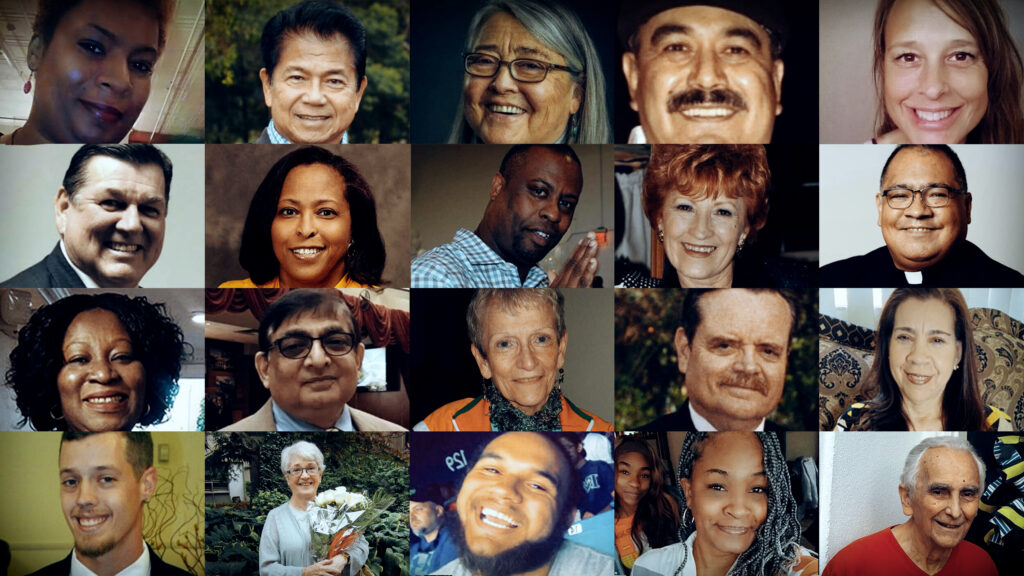The faces of Covid – STAT

Across the United States, more than 1 million of our family members, friends, neighbors, co-workers, and complete strangers are now gone, ripped from our lives by an unsparing pandemic that has battered us for two full years.
We are justifiably exhausted. But amid the desperate sprint to move on and put the trauma of this nightmare behind us, we are also at risk of making a tragic and avoidable mistake: As a nation, we are failing to process the grief and loss that surrounds us. We have a responsibility to remember the lost.
We remember them because their lives had dignity, meaning, and worth. They were more than just a statistic or another grim milestone. Behind the cascade of data about ventilators, ICU beds, hospitalizations, and deaths were real people with rich, textured, beautiful lives. Young and old, they came from small towns and big cities in every corner of the country. They had dreams they hoped to fulfill and struggles they fought to overcome. They had careers of which they were incredibly proud and hobbies and passions that gave them deep purpose. They had meals they could cook better than anyone, and pranks they’d pull on their families that would have them roaring with laughter. They were someone’s rock, and the center of someone’s world. They loved and were loved.
advertisement
We remember them to show their families that they are not alone. Too many families said goodbye to their loved ones by Zoom or FaceTime, if they were lucky enough to say goodbye at all. Too many families were robbed of the communal rituals and funerals that their loved one deserved or their families needed, replaced instead with the solitary grief and mourning of the pandemic’s relentless isolation. The abrupt shift to post-pandemic rhetoric and public health policies, without any true reckoning with the trauma and devastation left in the pandemic’s wake, have rendered too many who lost so much invisible. To them, the words “return to normal” refer to a reality that no longer exists. We can tell their stories and cry and grieve and say out loud that when their loved one died we all lost something and we are all diminished.
We remember them because we are all bearing witness to this pandemic while its story is still being written. That story is not only incomplete without our testimony of the names and faces of those we’ve lost, but it is also being deliberately and opportunistically distorted, rewritten, and erased by those who stand to benefit from anti-science, conspiracy-theory-infused efforts to diminish the severity of the pandemic’s toll. We cannot let that happen. History will repeat itself if we fail to tell the story of the pandemic’s devastation accurately and honestly.
advertisement
We remember them because it is through their stories that we can start to hold those who failed us accountable. Many died because our political leaders didn’t take the threat of Covid seriously, and because they failed to put in place public health measures that could protect our most vulnerable. Some died because they were forced into work without proper protective gear, or because the nursing home in which they resided was unsafe. Some died in communities where for decades their health was degraded by entrenched medical racism, environmental injustice, and systemic inequality, and others died because they fell victim to deliberate misinformation and anti-science aggression directed at a vaccine that could have saved their lives. We remember those we’ve lost because accountability for these failures will be a part of their legacy, and it begins with telling their story. We cannot make it convenient for our leaders to look away.
We remember them because it could have been us, and because this virus is still here, and people are still dying. You may not know it from the headlines, but more than 10,000 died of Covid nationwide in April, and for the immunocompromised in our communities who can’t benefit from the protection of vaccines, our acceptance of this level of death and virus means they’ll continue to live in a constant state of fear and anxiety. While some of us simply got lucky and dodged serious illness these past two years, others have had their lives upended by a brutal prison of symptoms known as long Covid. We remember those we’ve lost to remind us of what’s at stake, to see ourselves in the suffering of others, and to use our voices to advocate on behalf of those who are still at risk.
We remember them because empathy, in policy and practice, will be our way out of this pandemic. After years of political polarization and erosion of the civic square, the thin strands of our social fabric have been fully ripped apart. Under the banner of freedom, liberty, and individualism, too many Americans decided that their own personal needs and wants meant more than what could protect our community as a whole. As a result, the United States has suffered one of the highest Covid death rates in the world, and our trust in one another has all but evaporated. We tell their stories because doing so shows our commitment to the restoration of a compassionate, empathetic society that lifts up everyone, and because of our responsibility to doing our part in service to the common good. It is how we can start, finally, to pick up the pieces.
Alex Goldstein is the creator of FacesOfCovid, a social media platform that has shared the stories of more than 7,000 people who have died of Covid-19. This essay was published in conjunction with the Boston Globe.


